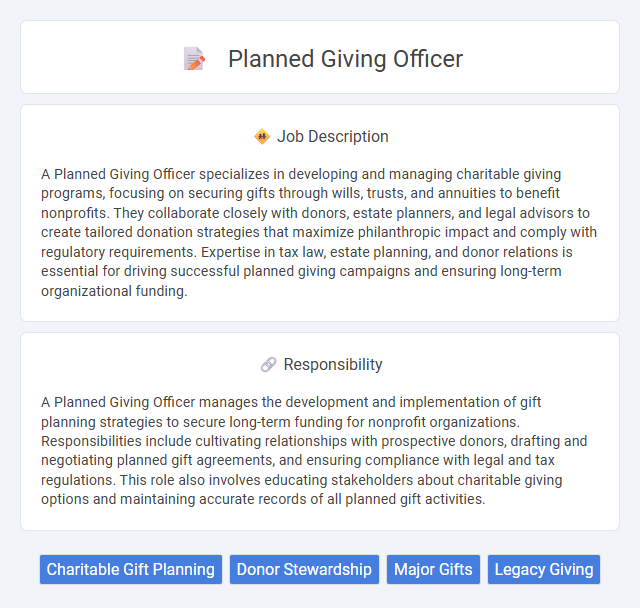
A Planned Giving Officer specializes in developing and managing charitable giving programs, focusing on securing gifts through wills, trusts, and annuities to benefit nonprofits. They collaborate closely with donors, estate planners, and legal advisors to create tailored donation strategies that maximize philanthropic impact and comply with regulatory requirements. Expertise in tax law, estate planning, and donor relations is essential for driving successful planned giving campaigns and ensuring long-term organizational funding.
Individuals with strong communication skills and a genuine interest in philanthropy are likely suitable for a planned giving officer role. Those who exhibit patience, attention to detail, and the ability to build long-term relationships might find the position fitting. Candidates less comfortable with persuasive interaction or meticulous legal and financial documentation could face challenges in this job.
Qualification
A Planned Giving Officer typically requires a bachelor's degree in finance, marketing, nonprofit management, or a related field, alongside several years of experience in fundraising or donor relations. Strong knowledge of tax laws, estate planning, and financial instruments such as trusts, annuities, and bequests is essential to effectively structure planned gifts. Proficiency in relationship management, excellent communication skills, and the ability to analyze complex financial data are critical qualifications for success in this role.
Responsibility
A Planned Giving Officer manages the development and implementation of gift planning strategies to secure long-term funding for nonprofit organizations. Responsibilities include cultivating relationships with prospective donors, drafting and negotiating planned gift agreements, and ensuring compliance with legal and tax regulations. This role also involves educating stakeholders about charitable giving options and maintaining accurate records of all planned gift activities.
Benefit
A Planned Giving Officer likely enhances an organization's long-term funding stability by developing strategic charitable giving programs. This role probably attracts donors interested in estate gifts or bequests, increasing the potential for substantial future contributions. Effective management of planned gifts can provide predictable revenue streams and foster stronger donor relationships.
Challenge
Facing complex donor expectations and navigating evolving legal regulations are likely challenges for a planned giving officer. The role probably demands strong relationship-building skills to secure long-term commitments amid competitive philanthropic landscapes. Managing diverse financial instruments and ensuring compliance might also require continuous learning and adaptability.
Career Advancement
A Planned Giving Officer plays a crucial role in securing long-term funding through bequests, trusts, and endowments, positioning themselves as key contributors to an organization's financial sustainability. Mastery in relationship management, legal knowledge of estate planning, and proficiency in financial instruments advances career opportunities toward leadership roles such as Director of Development or Chief Advancement Officer. Continuous professional development and certification, such as CFRE (Certified Fund Raising Executive), significantly enhance prospects for upward mobility and higher compensation in nonprofit and educational institutions.
Key Terms
Charitable Gift Planning
Planned giving officers specialize in charitable gift planning, developing strategies to secure donations through wills, trusts, and other estate gifts. They collaborate with donors to align philanthropic goals with tax benefits, ensuring sustainable funding for nonprofit organizations. Expertise in legal regulations, donor relations, and financial instruments enhances their ability to maximize long-term charitable contributions.
Donor Stewardship
Planned giving officers play a crucial role in donor stewardship by cultivating long-term relationships with donors through personalized communication and recognition strategies. They manage complex gift arrangements such as bequests, trusts, and annuities, ensuring that donors feel valued and informed throughout the giving process. Effective donor stewardship by planned giving officers increases retention rates and maximizes lifetime giving potential.
Major Gifts
A Planned Giving Officer specializing in Major Gifts cultivates and manages relationships with high-net-worth donors to secure significant, long-term contributions through planned giving instruments such as bequests, charitable gift annuities, and trusts. This role requires expertise in tax laws, estate planning, and donor motivation to design impactful giving plans that align with both donor intentions and organizational goals. Success is measured by the ability to increase major gift commitments, ensuring sustained funding for strategic initiatives and operational growth.
Legacy Giving
A Planned Giving Officer specializes in securing legacy giving commitments from donors, ensuring long-term financial support for non-profit organizations. This role involves developing and managing gift agreements such as bequests, trusts, and endowments that integrate donor intentions with institutional goals. Expertise in tax law, estate planning, and donor relations is essential to effectively facilitate legacy giving programs.
 kuljobs.com
kuljobs.com